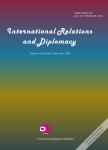Malaysia's Contemporary Political and Economic Relations with Iran
Malaysia's Contemporary Political and Economic Relations with Iran作者机构:Universiti Malaysia Sabah Kota Kinabalu Malaysia
出 版 物:《International Relations and Diplomacy》 (国际关系与外交(英文版))
年 卷 期:2015年第3卷第2期
页 面:123-133页
学科分类:030208[法学-外交学] 0302[法学-政治学] 03[法学] 030206[法学-国际政治]
主 题:politics business economics co-operations bilateral relations
摘 要:Traditionally, Malaysia's relations with the Middle Eastern World boil down to narrow-limited interaction with only a handful of countries, mainly Egypt, Saudi Arabia (before known as Hejaz), and Turkey. The underlying reasons behind are largely owing to the established ancient relations and religious fulfillments like performing pilgrimage as well as pursuing religious studies in highly respected institutions. Malaysia's relation with the Islamic Republic of Iran, however, has shown steady progress of development since the end of 1960s and onwards. Although Iran has become an Islamic Republic after the eruption of the Revolution in 1979, the relations remain intact in spite of the potential expansion of Iran's religious ideology, Shi'ah, among Malaysian Muslim communities. On top of that, with Iran now facing economic sanctions due to its nuclear programs, both countries continue to bolster their relations, especially in political and economic interactions. Contemporarily, both Malaysia and Iran are closely working together to further enhance the level of their relations. The leaders of both countries have quiet regularly exchanged visits and have also actively ventured into promising business opportunities. Iran ranked as the Malaysia's third West Asian trading partners along with the United Arab Emirates (UAE) and Saudi Arabia, provides a lot of opportunities for Malaysia to seize onto. In other words, Malaysia's contemporary relations with Iran will evolve beyond the dogma of the Iranian Revolution in 1979.



